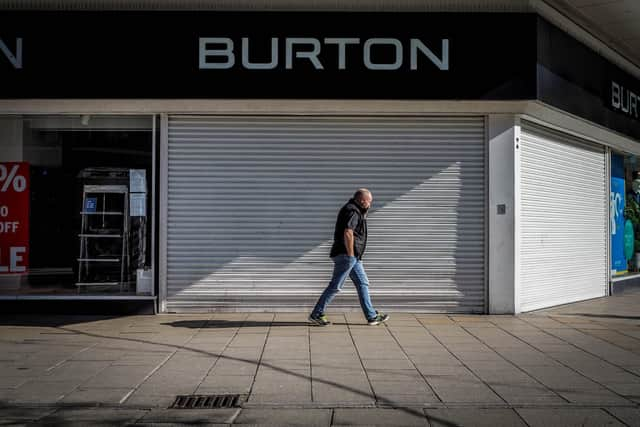Coronavirus: The types of shops that can and can't open during UK lockdown
and live on Freeview channel 276
Boris Johnson announced the country-wide ‘lockdown’ in a national address last month.
People will only be allowed out to take a trip to do essential shopping as well as one form of exercise each day.


Advertisement
Hide AdAdvertisement
Hide AdIf you are wondering what does and does not count as an ‘essential’ shop, here’s what the government’s guidance says:
What can stay open?
The following retail premises are considered to be ‘essential’ and can continue to open:
- Supermarkets and other food shops
- health shops
- pharmacies including nondispensing pharmacies
- petrol stations
- bicycle shops
- home and hardware shops
- laundrettes and dry cleaners
- bicycle shops
- garages
- car rentals
- pet shops
- corner shops
- newsagents
- post offices
- banks
- Market stalls which offer essential retail, such as grocery and food.
Restaurants can continue to deliver food and run takeaway services.
Advertisement
Hide AdAdvertisement
Hide AdWhile the following can also stay open: cafés or canteens at hospitals, care homes or schools; prison and military canteens; services providing food or drink to the homeless.
What has to shut?
- Restaurants
- Cafes, including workplace canteens
- Pubs
- Bars and nightclubs, including bars in hotels or members’ clubs
- Hair, beauty and nail salons, including piercing and tattoo parlours
- Massage parlours
- Retail – except those noted above
- Outdoor and indoor markets
- Auction houses
- Car showrooms
Advertisement
Hide AdAdvertisement
Hide Ad- Hotels, hostels, BnBs, campsites and boarding houses for commercial use
- Caravan parks/sites for commercial uses
- Libraries
Coronavirus: the facts
What is coronavirus?
Covid-19 is a respiratory illness that can affect lungs and airways. It is caused by a virus called coronavirus.
What caused coronavirus?
The outbreak started in Wuhan in China in December 2019 and it is thought that the virus, like others of its kind, has come from animals.
Advertisement
Hide AdAdvertisement
Hide AdHow is it spread?
As this is such a new illness, experts still aren’t sure how it is spread. But similar viruses are spread in cough droplets. Therefore covering your nose and mouth when sneezing and coughing, and disposing of used tissues straight away is advised. Viruses like coronavirus cannot live outside the body for very long.
What are the symptoms?
The NHS states that the symptoms are: a dry cough, high temperature and shortness of breath - but these symptoms do not necessarily mean you have the illness. Look out for flu-like symptoms, such as aches and pains, nasal congestion, runny nose and a sore throat. It’s important to remember that some people may become infected but won’t develop any symptoms or feel unwell.
Michael Eisner urges Portsmouth fans to respect government directives as he sends message of support to club
What precautions can be taken?
Advertisement
Hide AdAdvertisement
Hide AdWashing your hands with soap and water thoroughly. The NHS also advises to cover your mouth and nose with a tissue or your sleeve (not your hands) when you cough or sneeze; put used tissues in the bin immediately and try to avoid close contact with people who are unwell. Also avoiding touching eyes, nose and mouth unless your hands are clean.
Sources: World Health Organisation and NHS
Comment Guidelines
National World encourages reader discussion on our stories. User feedback, insights and back-and-forth exchanges add a rich layer of context to reporting. Please review our Community Guidelines before commenting.
